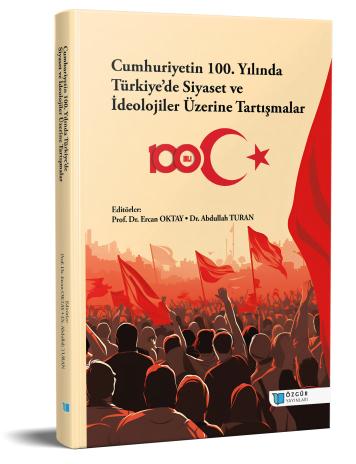
Cumhuriyetin 100. Yılında Türkiye'de Siyaset ve İdeolojiler Üzerine Tartışmalar
İndir
Özet
“Cumhuriyetin 100. Yılında Türkiye’de Siyaset ve İdeolojiler Üzerine Tartışmalar” başlıklı bu çalışma adından da anlaşıldığı üzere yüz yıllık Cumhuriyet dönemini esas almakta ve bu konuda siyasi ve ideolojik tartışmaları ortaya koymaktadır. Cumhuriyet tarihi birbirinden farklı siyasi ve ideolojik dönüşümler yaşamıştır. Bu yönleri derinlemesine incelemek ciltler dolusu kitap gerektirir. Ancak bu çalışma bu meseleye dair bazı hususları incelemeye alarak alanyazına katkı sağlamayı amaçlamıştır.
Kitabın birinci bölümü aslında tüm siyasi tarihin özeti niteliğindedir. Türkiye’deki ideolojik dönüşümlerin hangi alanlarda gerçekleştiğini ortaya vii koymakta ve bu hususta altı sacayağı belirlemektedir. Bu çerçevede “tarihi, kültürel ve ekonomik dayanaklar”, “siyasi partiler”, “siyasi aktörler/liderler”, “iç ve dış siyasi olaylar”, “siyasi kurumlar” ve “siyasi politikalar” şeklinde tespit edilen altı sacayağı çalışmada siyasi tarihten örnekler baz alınarak incelenmiştir.
Kitabın ikinci bölümü ise daha spesifik bir noktaya odaklanarak Erken Cumhuriyet dönemindeki Kadro Hareketleri’nin süreçlerini ve devletçilik düşüncesinin gelişimi ile yansımalarını incelemiştir. Bu bölüm, Erken Cumhuriyet döneminde benimsenen devletçilik düşüncesini, Cumhuriyetin gereksinimleri bağlamında incelemeyi ve analiz etmeyi amaçlamaktadır. Aynı zamanda, Kadro Hareketi’nin devletçilik yaklaşımının ekonomik bağımsızlığın gerçekleşmesine, Cumhuriyet felsefesinin ilke ve değerlerinin toplum tarafından benimsenmesine ve sürdürülmesine nasıl katkı sağladığını ortaya koymayı hedeflemektedir. Bu amaçlar doğrultusunda geniş bir repertuar sunmaktadır.
Kitabın üçüncü bölümünde Türkiye’de gerçekleşen askeri müdahalelerin Türkiye’deki siyasi ideolojileri nasıl etkilediği konusu seçimler ile partiler üzerinden analiz edilmiştir. Dolayısıyla Türk siyasetindeki ideolojilerin siyasal hayattaki konumlanma biçimi ile askeri müdahaleler arasındaki ilişki irdelenmiştir. Çalışma askeri müdahaleler özelinde siyasal hayattaki ana akım ideolojilerin müdahale sonrası kısa vadedeki durumu üzerine odaklanmıştır. Dolayısıyla ideolojiler; iktidarda ya da muhalefette olma, siyasal tabanda karşılık bulma ya da siyasal alanda karşılık bulamama ve siyasal partilerce temsil edilme ya da temsil edilmeme gibi kriterler dikkate alınarak seçimler ve siyasal partiler üzerinden incelenmiştir.
Kitabın dördüncü bölümü ise Türkiye’deki sol ideolojilere odaklanarak özellikle solun yoğun olarak işlevsel olduğu 1960 ile 1980 arası dönemi ele almıştır. Bu süreçte solun nasıl şekillendiği aktarılmıştır. Çalışma kapsamında sol tanımlanmış, tarihsel süreç içerisinde sol bünyesinde gelişme gösteren sosyal demokrasi, sosyalizm ve komünizm ideolojileri açıklanmıştır. Bu hareketler içerisinde sol için önemli yayın organı olan Yön Dergisi, sol fikirlerin etkisiyle politize olan öğrenci eylemleri, güçlenen sermayedarlar karşısında sendikalaşan işçi sınıfları, solu yasal zeminde arayan Türkiye İşçi Partisi (TİP), devrimi zor kullanarak gerçekleştirmeye çalışan Milli Demokratik Devrim (MDD) hareketi ve Cumhuriyet Halk Partisi (CHP)’nin kitlelere ulaşmak amacıyla geliştirdiği ortanın solu söylemi incelenmiştir.
Kitabın beşinci bölümünde Türk siyasi hayatında kuruluşu, gelişimi, zayıflaması ve dönüşmesi perspektifinde Milli Görüş Hareketi partileri incelemeye alınmıştır. Bu hareketin iki kutuplu dünyanın liberalizm ve viii sosyalizm çerçevesinde işletmeye çalıştığı yıkımın bir çözümü olması yönü incelenmiştir. Çalışmada ayrıca hareketin bürokrasi unsurlarınca engellenmesi süreci değerlendirildiği gibi siyasi ideolojilerin bürokrasi yaklaşımına ve Milli Görüş partilerinin programları, koalisyon protokolleri ve seçim beyannameleri çerçevesinde bürokrasi yaklaşımlarına odaklanılmıştır.
Kitabın altıncı bölümü, son zamanlarda daha popüler olan yeşil ideoloji konusuna eğilmektedir. Türkiye’de yeşil siyasetin tarihi üzerine eğilen bu bölümde yeşil siyaset, esas olarak yeşil partilerin varlığı ve faaliyetleri üzerinden anlamlandırılarak incelenmiştir. Ayrıca Türkiye’de yeşillerin tarihi anlatılırken siyasi kimliği yeşil bir ideoloji etrafında şekillenen yeşil hareket de bölüm kapsamı içerisine dahil edilerek irdelenmiştir. Bu bağlamda 1988’den 2023’e aynı çizgide ilerleyen, zaman zaman siyaset sahnesinin dışında kalan yeşil siyasetin Türkiye’deki tarihsel izleği değerlendirilmiştir.
Kitabın yedinci bölümünde yine son zamanlarda oldukça dikkat çeken ve incelenen bir konu olan akıllı kentlere ve bu kentlerin neoliberal çerçevede değerlendirmesine yer verilmiştir. Bölümde “neoliberal politikaların akıllı kent girişimlerinin geliştirilmesinde kritik bir araç olarak yaygın şekilde kullanıldığı ve bunun ticarileşme ve özelleştirme, sosyal dışlanma, eşitsizlik, mekânsal parçalanma gibi zararlı sonuçlara yol açtığı” hususu değerlendirmeye alınmıştır. Bu bağlamda neoliberal politikaların akıllı kent girişimlerini teşvik eden “teknoloji, maliyet ve kamu-özel sektör ortaklıkları” meseleleri irdelenmiştir.
Kitabın sekizinci ve son bölümünde ise Türk ideolojik yaklaşımının dışarıya dönük uzanımları örneklendirilmiştir. Bölümde Karabağ örneği üzerinden Azerbaycan’ın yaşadıkları ve Türk milliyetçiliği perspektifinde TürkiyeAzerbaycan ideolojik ve politik ortaklığı temelinde Karabağ Zaferine olan katkıları aktarılmıştır. Özellikle Türk ulusunu Avrasya coğrafyasının en önemli milleti konumuna yükseltecek olan Turan Koridoru olarak da ifade edilen Zengezur Koridoru’nun işlevsel hale getirilerek Turan coğrafyasına kapı açan ideolojik yaklaşım ortaya konulmuştur.
Prof. Dr. Ercan OKTAY
Dr. Abdullah TURAN

